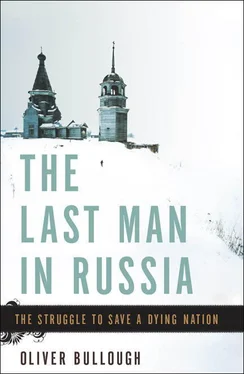Again this is a time that Father Dmitry did not linger over in his memoirs, but he did write that he was revolted by the mass rape of women in newly taken towns, and by the obscene language used by his fellows. He wrote not of battle but of saving an icon from being destroyed, and about how soldiers at night cough like sheep. He refused to join the Komsomol, the Young Communist League, because he was a believer. He claimed never to have fired a shot in anger. Then he was injured. A shell fragment entered his leg and, while in hospital, he contracted typhus fever. His military career was over.
He returned to Berezina, but life had changed. Stalin was aware of the role the Orthodox Church had played in winning support for the war effort. He allowed the German-opened churches to remain open, so there was somewhere for Father Dmitry to worship.
He was a war veteran with a pension, but there was no work for him. Months went by. He reported to the military commission, but they had no orders for him. That was when he saw the advertisement that changed his life: an Orthodox seminary was taking applications for trainee priests in Moscow, the first such intake for decades. This was part of Stalin’s bargain with the Orthodox Church. Father Dmitry applied, was accepted and left for Moscow. He was gone by the time his brother Vladimir returned from the front.
‘He had gone to Moscow and gone to study in the seminary. This was in 1944, when the war was going on still,’ Vladimir told me when I was in Berezina. ‘It was very hard to study there, to get in there.’
I met Vladimir after church in Berezina one Sunday. I was late for the service so I sat outside, waiting for it to end. While I was sitting in the morning sunshine reading through Father Dmitry’s memoirs, the priest unexpectedly stepped out into the sunshine. He was still holding the incense and a candle, but was talking into his mobile phone.
‘We’re still holding the requiem,’ he told his caller, promising to call back later. He gave me a quizzical look and turned back inside. A chicken strutted round from the back of the church, pecking at the dust on the path.
At last, the service was over and the priest came out to ask who I was. I explained my interest in Father Dmitry, and he pointed out Vladimir. Vladimir in turn called over his daughter Maria. Maria hailed Lidiya, daughter of one of Dmitry’s sisters, perhaps of the woman he had smashed round the head and driven out of their garden. We sat in the church building, which was deliciously cool now the day was heating up, and I asked them what had made Father Dmitry the man he was. Vladimir’s hearing was bad, and his accent was thick. Lidiya had to repeat my question to him, her accent spongy with the soft ‘g’ of peasant Russia.
‘Our parents were believers, and they implanted the faith in us children. I remember my father was reading the Psalms, I was small, but I learned Psalm number 50 by heart because I heard how he read it,’ Vladimir said. He had very clear blue eyes, like a child’s.
Lidiya filled in for him. She was born in 1938, so presumably she was repeating his memories anyway: ‘They took our grandfather’s land, his horse. They took everything. Life was bad then, though it’s not much better now.’
Maria, a tall woman in a russet headscarf and violently patterned blue and green dress, had been quiet. She sat holding her father’s hand, curls of hair emerging over her forehead. She had clearly felt she had nothing to say on the subject of the 1930s, but life today was a different matter.
‘Life is poor, we don’t live, we survive. We count pennies. One daughter studies in college, the other has finished eleven classes and needs to study in college too. And pay? Well, give health to my grandfather. You have to pay to study. The grandfather pays. I don’t work. My husband earns 10,000 roubles a month. Can you really live on 10,000?’
A monthly salary of 10,000 roubles is about £200.
‘Just for accommodation we pay 5,000. A kilogram of meat costs 260 roubles. How can anyone live on 5,000? Milk is 20 roubles a litre. And we need clothing. And everything. We don’t live. We survive. The girls are beautiful, they want to look good. And milk is more expensive in winter.’
I pulled a new notebook out of my bag, and they began to talk among themselves. Even in the bad times, they said, children were born, but now the village was dying. Vladimir, who had a habit of laughing at things that did not seem funny, chuckled: ‘The death rate is conquering the birth rate.’
Maria talked over him: ‘There’s no work. Most people work in Moscow on the building sites. That’s men. Women work in shops. It’s very hard to find work. My daughters finish school, and college, so as to get a job in a shop. God willing. One is working in marketing, the other in the commercial section. And without higher education you can’t even work in a shop.’
Vladimir laughed again. ‘The bad life left with the Soviet Union, but the good life did not come, it did not come.’
I took some photos of the family before leaving. Vladimir stood with his vulnerable, baby-blue eyes, flanked by the two cousins. I then walked out of the church and back down Berezina’s street. Most of the houses were single-storey squares set in their own gardens. A five-storey block, of the standard Soviet design found everywhere from Armenia to the Arctic, towered over them, but most of its balconies lacked washing lines. They were empty.
The fields either side of the lane were mainly given over to potatoes, but one field of barley stood by the main road. I barely recognized it at first, being accustomed to barley how my grandfather grew it, in tightly regimented blocks surrounded by raw earth. Here the sandy soil was choked with grasses and wild oats that shaded into the barley with no clear division between crop and weed.
It was only when I stopped and looked up and down the road that I realized I had no clear plan how to get back to Unecha. I had got a lift here with a fellow guest at the hotel who was driving to Moscow, but now I would need public transport. There was a bus stop on the other side of the road: an open-fronted, heavy-roofed shed, which had lost its benches. A plank was balanced in a corner to be sat on. I sat on it for a while, and waited for a bus to come. It was uncomfortable.
Cars passed about every three minutes. A bus passed after twenty minutes, and another half an hour later. They ignored my waves. I read more of Father Dmitry’s memoirs as I waited. He had little more than his brother to say about the German occupation.
The Germans dissolved the collective farms, he wrote, and the farmers worked for themselves again. The chairman and secretary of the collective farm, who had testified against his father’s religious activities, even started to visit the newly reopened church. Life improved.
I put the papers away, and walked to the edge of the forest. There was a building there I wanted to look at. The fields were fallow, and the enormous barn was rusty and decaying. This had once been a major grain silo, with five hoppers controlled by switches, to load grain on to trucks. The electric circuits had been plundered long ago and the fuse boxes were clogged with old birds’ nests, the copper wire stolen. Dozens of wagtails had set up home. They did not mind me, but another bird that I did not recognize complained as I poked about: ‘Tut tut cheep tut tut cheep.’
Four rooks mobbed a buzzard on the margin on the trees, the dense saw-toothed wall of conifers. Swifts screamed overhead and mice scuttled in the long grass. The old collective farm was heaven for wildlife, but hostile for humans. No trucks had been driven here for years and years. I looked over to the bus stop and saw that a woman was now waiting, which made me suspect a bus was due.
Читать дальше












